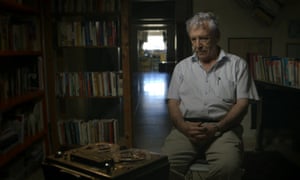Israeli veterans recall horrors of country’s victory in six-day war
Israeli soldiers had already searched the Palestinian families trudging away from their homes, cleared them of their weapons, and sent them on their way. Then a second group of soldiers pulled up in a car, separated out the men, took them to one side and shot them.When horrified observers asked their commander, “How could this be?”, he shrugged off the massacre. “When you chop wood, chips fly,” he told his men.
The casual murder of 15 civilian men, yards away from their mothers, wives and daughters, is just one of the alleged war crimes detailed by Israeli veterans of the six-day war of 1967 in Censored Voices, a challenging exploration of a conflict at the heart of Israel’s identity.
“They are not only voices of our past; they are the voices of our present and our future. This war is affecting us every single day since then,” said director Mor Loushy, in her first interview with British media about her controversial film.
The first-person testimony of the horrors of all war – and the mistakes and brutality of this conflict in particular – was narrated by reservists just days after they returned from the fighting, but the account was then locked away for nearly half a century. Loushy was transfixed by the gap between their accounts and the history of the war in Israeli collective memory. “We didn’t have the other voice that knew from the beginning that this war was going to lead us to a terrible place,” she said.
“Are we doomed to bomb villages every decade for defensive purposes?” one wonders. “Are we doomed to live in the pauses between wars?”
The film opens with the terror that hung over Israel in the run-up to war and traces the jubilation of the soldiers as they race to victory, and then their growing confusion as a simple war for survival shifts into a darker conflict. “I was convinced the war was just because it was over our existence,” one veteran says as he picks through his memories. “But it became something that it wasn’t in the beginning.
On 5 June 1967 the country feared annihilation as Arab nations massed their armies near its borders. By June 10, Israel had all but destroyed the Egyptian and Syrian air forces, controlled all of Jerusalem, the West Bank, Gaza and Sinai, and was overwhelmed with euphoria.

Setting off for kibbutzes across the country, he sought out fellow veterans and asked them to share their memories. He found young men haunted by memories of dead friends and slaughtered enemies, and traumatised by their role in the forcible eviction of Palestinian families. On tapes in quiet rooms, veiled in the semi-anonymity of audio recordings, they poured out the stories of horror and tragedy.
One recalls: “My friends, friends I went to school with, who I know as good people, these same people, one of them sees a wounded enemy, so he doesn’t go to help him but draws his Uzi to finish him off. And an Arab runs in the desert, so he lifts his Uzi and fires, for no reason, out of murder.”
“I had a feeling I was evil,” another veteran says of forcing an old man from his home. “Nothing can make that feeling go away.”
Some of those stories were collected in a book, The Seventh Day, published soon after the war. Loushy stumbled over it while studying for a history degree and decided the story needed a bigger audience. “You can’t imagine how many films there are telling the heroic story of the six-day war,” says Loushy, who spent years tracking down the tapes, the veterans and rare footage from around the world to illustrate the story they told. “It’s important that younger generations have this film on the shelf.”
Some of the soldiers, who at the time were a little more than two decades away from the horrors of the Holocaust, describe being painfully torn between the pressing need to fight for their own survival and the cost to others. “I could see myself in those kids who were carried in their parents’ arms, when my father carried me,” one says. “Perhaps that’s the tragedy, that I identified with the other side. With our enemies.”

“I don’t believe this is the last time we’ll have to wear uniforms,” one says. “I always have a feeling that the next round will be much crueller because we have become a conquering army. This is actual occupation.”
Loushy, who spent years working on the film, found these warnings, and the way they were buried, among the most important and tragic parts of the veterans’ story. “They knew that if we kept those territories it would be the end of the state that they dreamt of, that it will destroy us. And I think they were right. Because they were on those territories, they fought on the battlefield, they saw in those short six days what it is like to occupy a civilian society, and they understood the deep meaning of it. This is the tragedy of it – they saw it, they spoke about it. But Israel just fell in love with the territories.”
No comments:
Post a Comment